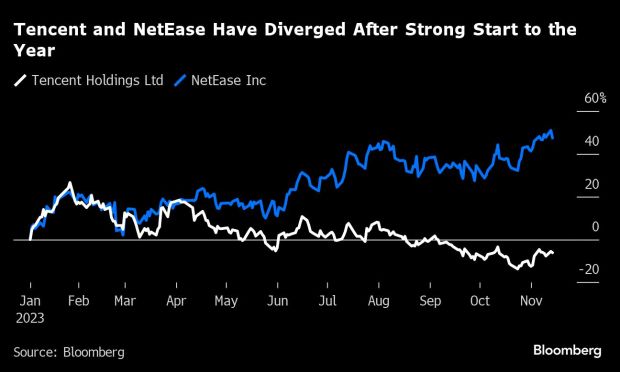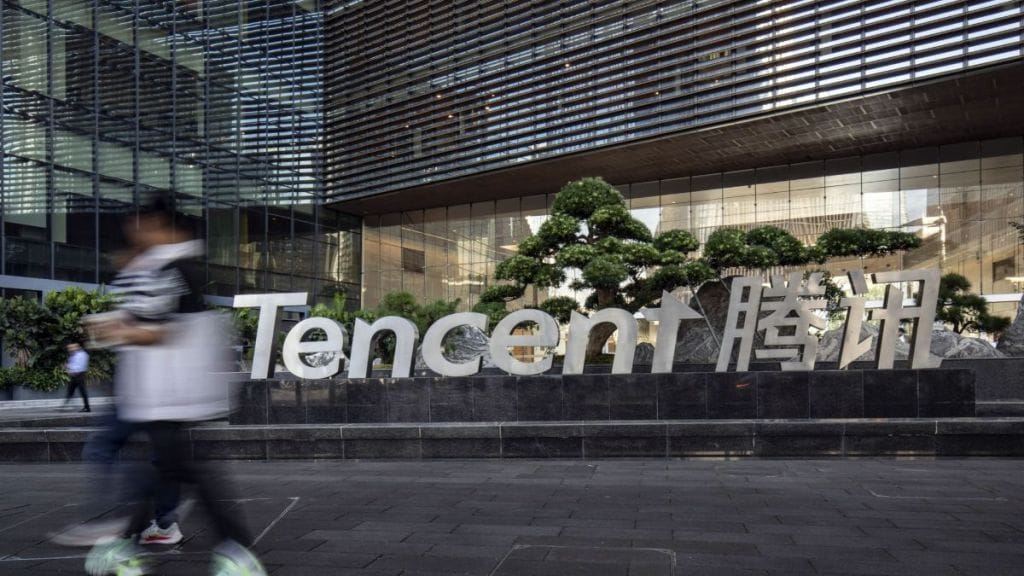Tencent Holdings Ltd.’s earnings beat estimates after online advertising rebounded, a sign that Chinese consumers are turning to social media and games despite a nationwide downturn.
The WeChat operator reported growth across divisions from gaming and advertising to fintech, driving a 10% gain in revenue to 154.6 billion yuan ($21.4 billion) for the September quarter. Net income slid 9%, reflecting ramped-up spending on content, but still exceeded expectations at 36.2 billion yuan. Shares in Prosus NV, a proxy for Tencent as its largest shareholder, climbed more than 4% in Europe.
The results may help assuage concerns that the world’s largest internet arena has lost steam after years of regulatory and economic turmoil. They reinforce views that lower-cost and leisure spending remain resilient despite pullbacks in a plethora of segments from luxury to overseas travel. Investors worry that the Chinese economy is in danger of entering a deflationary spiral, a fear reinforced by lackluster spending on e-commerce platforms during this year’s Singles’ Day shopping festival.
Online advertising, typically closely associated with the economic climate, was Tencent’s fastest-growing division with a 20% gain in revenue. That was driven in part by growing user engagement in WeChat’s video accounts, where total views climbed 50% during the quarter. That’s good news for Tencent, which has tried for years to fend off a charge by TikTok-owner ByteDance Ltd. into online media.

Notably, the company’s gross margins neared 50%, or levels not seen since 2018. E-commerce player JD.com Inc. on Wednesday reported results that also surpassed expectations.
More broadly however, Chinese consumption remains muted due to a plethora of headwinds from a crumbling property market to rising youth unemployment. Deflationary pressure worsened in October, fueling expectations the world’s No. 2 economy needs more stimulus. And Tencent’s own pace of expansion remains well off a pre-Covid peak. Some of the quarter’s growth came from abroad, after international gaming revenue surged 16%.
Alibaba Group Holding Ltd. and NetEase Inc. will report earnings Thursday in another set of signals on how e-commerce and gaming fared during the post-pandemic reopening.
“The substantial year-over-year improvement in gross margin points to structural profit gains driven by a shift in revenue mix,” Union Bancaire Privee analyst Vey-Sern Ling said. But “the positive stock response also underscores how low expectations have sunk, a factor to bear in mind across the remainder of China tech reports the next few days.”
Tencent hopes its mainstay businesses from gaming to payments are less vulnerable to the downturn as consumers keep spending on low-ticket items. Monetization by summer hits including Valorant and Lost Ark is expected to fully kick in during the remainder of this year, while the world’s biggest games publisher expands Honor of Kings – its most lucrative intellectual property – into more genres.
There’re signs that Tencent is beating back a foray by its main social media rival into gaming. ByteDance is considering the sale of Moonton, a high-profile studio it bought for $4 billion just years ago, in what would be the TikTok operator’s biggest retreat from the space.
Longer-term, Tencent joins much of the Chinese tech sector in exploring the potential of generative AI. Its in-house large language model, Hunyuan, is now integrated with more than 180 services including search and online marketing. Together with arch-foe Alibaba, the Shenzhen-based company also made multiple bets on domestic AI upstarts in the so-called “war of a hundred models,” helping mint new unicorns like Baichuan. On Wednesday, the company pledged to continue investment.
Still, WeChat for now is a more dependable growth driver than any AI foray.
China’s go-to super app is credited with engineering a turnaround in ad sales, after its short video feed lured users and marketers back from ByteDance’s Douyin. But TikTok’s Chinese twin, meanwhile, is rapidly encroaching on WeChat’s territory, adding real-world services like e-commerce and food delivery.
Shares of Tencent have plunged roughly 25% since its January high, trailing the Hang Seng Tech Index. That’s despite the Chinese firm returning about $24 billion to shareholders via buybacks and dividends this year. Tencent’s largest shareholder Prosus remains an overhang, as the Dutch investment arm of Naspers Ltd. has been gradually offloading its Tencent stake to fund its own buybacks.

